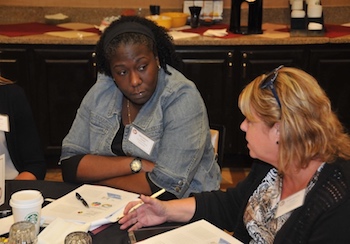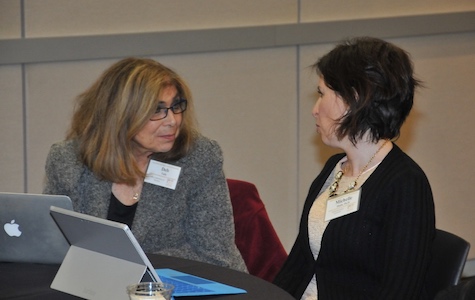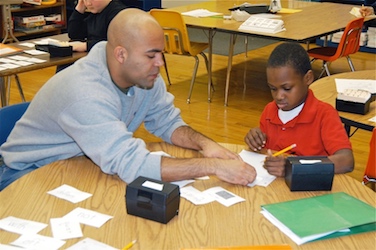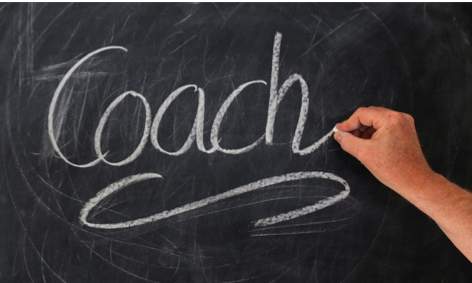Coaching as an Essential Component of Professional Learning
Educator Perspectives on What Matters Most
It’s commonly understood that coaching is an important component of effective professional development (PD); however, the expanded use of coaching as part of PD programs is a fairly recent phenomenon, beginning with the No Child Left Behind (NCLB) Act of 2002 and reinforced, soon after, in the 2004 reauthorization of the Individuals with Disabilities Education Improvement Act (IDEIA).

In Using Implementation Science to Close the Policy to Practice Gap, Duda and Wilson (2015) cite a 2002 meta-analysis conducted by Joyce and Showers, noting that “training should be accompanied by coaching in order to lead to behavior change or use of the new skills in the classroom” (p. 14).
In the parlance of implementation science, coaching is one of several staff competency drivers – strategies that support personnel in the use of a new skill, program, or intervention.
But, what is coaching and how important is it? The International Coach Federation (ICF) defines coaching as partnering with clients in a thought-provoking and creative process that inspires them to maximize their personal and professional potential.1 Similarly, in Excellence in Coaching: The Industry Guide, Bresser and Wilson (2016, p. 12) describe various aspects of coaching, stating that “at the heart of coaching lies the idea of empowering people by facilitating self-directed learning, personal growth and improved performance.”
A soon-to-be published Ohio Leadership Advisory Council (OLAC) module on coaching concludes:
Coaching appears to be a big help for anyone trying to break old habits. So when coaching is done well, and when it’s part of a well conceived and responsibly implemented reform effort (see Kraft et al., 2016), professional practice does change. That’s the good news. The bad news? Good coaching in a well conceived and responsibly implemented reform effort is a major accomplishment in itself.
Getting it Right
One program that incorporates coaching as a critical component of the overall PD program is the Ohio Leadership for Inclusion, Implementation, & Instructional Improvement (OLi4). OLi4 is a PD program conceptualized by and coordinated through the University of Cincinnati Systems Development & Improvement (SDI) Center in collaboration with OLAC and key regional and professional association partners. The project is supported through funding from the Ohio Department of Education (ODE) offices for Exceptional Children and Improvement and Innovation.
OLi4 positions principals to be inclusive instructional leaders, contributing to their district and school’s capacity to improve instructional practice and adult and student learning. The project grounds all PD components in a shared leadership approach, and aligns PD content with the Ohio Improvement Process (OIP) and Ohio’s Leadership Development Framework (BASA, 2013).
Principals participate in project PD as part of a cohort, enrolling for a two-year period. Additionally, district leaders attend a portion of each centralized PD session and conduct in-district activities to strengthen district-wide capacity to support principals in the effective implementation of inclusive instructional leadership practices across six domains: visioning, using data well, using research and evidence to guide instruction, sharing leadership, coaching teaching, and reflecting on practice. Inclusive instructional leadership combines instructional leadership with social justice leadership.
In addition to participating in centralized PD and regional cadre discussion groups, OLi4 principals receive in-school monthly coaching using a performance coaching model (Allison, 2011). Performance coaching helps principals develop inclusive leadership practices by offering non-directive, non-judgmental support based in questioning, active listening, encouraging focused goal-setting, and enacting follow-through.2
OLi4 seeks to cultivate a reflective – rather than a compliance-oriented – approach to leadership based on trust, collaboration, and inquiry. Coaches use a combination of effective questioning and active listening to build trust, encourage focused goal-setting, and support principal follow-through on important work.
Inclusive Instructional Leadership –
Fostering inclusive instructional leadership is the purpose of OLi4 and OLi4 coaching. This form of leadership builds on the Ohio Improvement Process and its leadership teams: TBTs, BLTs, DLTs. It helps schools and districts develop instructional practices responsive to the needs of every student in a school (e.g., students of all races and ethnicities, students with disabilities, students living in poverty, English learners).
OLi4 Performance Coaching Practices: Excerpt
Coaching Rubric: Building Trust And Relationships
| Practices | Exemplary | Accomplished | Emerging |
|---|---|---|---|
| Building trust and relationships: The coach builds a trusting relationship with the principal by exhibiting trustworthiness. [Allison, Killion] | The coach directs his or her intentions, thoughts, and emotions in ways that promote effective on-going support to the principal; promises only what he or she can deliver; follows through on promises; communicates honestly; exhibits dependability by being timely, productive, and attentive to detail; treats the principal as an equal; demonstrates empathy; welcomes feedback from the principal; and maintains confidentiality as appropriate. | The coach is aware of how his or her intentions, thoughts, and emotions influence his or her efforts to provide on-going support to the principal; honors promises almost all the time; communicates honestly; always exhibits dependability by being productive and timely; demonstrates empathy; accepts feedback from the principal; and maintains confidentiality as appropriate. | The coach reflects on ways that his or her intentions, thoughts, and emotions can influence his or her relationship with the principal; honors promises most of the time; communicates honestly; typically exhibits dependability by being productive and timely; demonstrates empathy; is open to two-way communication with the principal; and maintains confidentiality appropriately (i.e., within the limits of professional ethics). |
Educator Perspectives
Educators, whether coach or coachee, seem to agree on three things, namely that (1) establishing trust, (2) supporting effective self-reflection and associated action, and (3) having shared clarity and focus on the right core work (i.e., teaching and learning) are essential in improving adult and student learning through effective coaching.
Establishing trust. According to OLi4 coach and former superintendent Rick Carrington (pictured below), building trust is essential to any partnership or relationship. “Work hard to build trust so the person you’re coaching knows that you have their best interest at heart,” said Carrington. “I try to let principals and the superintendents that I’ve worked with and districts know that if I can be a service in any way at all related or unrelated to OLi4 or any other work they’re doing, or if I can help secure resources to help them in other ways, to let me know,” he added. Carrington supports principal and districts in southern/southern eastern Ohio – the region where he was a district superintendent before joining State Support Team Region 15.

Deb Tully, Director of Professional Issues for the Ohio Federation of Teachers, agrees, noting “coaching can really only be effective once there’s a relationship with trust established between the coach and the teacher; there needs to be a relaxed atmosphere in which the teacher knows the coach is there to help and there’s no tie to evaluation.”
Tully also believes “being there with frequency…and getting to know what the learning environment is in that particular building or classroom…” are important aspects of establishing trust with the person being coached, whether that person is a teacher or a principal participating in OLi4. “Don’t come into the school as the ‘savior;’ it’s imperative that coaches treat the coachees, or the teachers, with respect.”

Like Tully, Josh Englehart, Superintendent of the Painesville City Local Schools in northeastern Ohio, highlights the importance of context in the coach-coachee relationship: “It’s challenging for an external coach who doesn’t understand the context to guide someone or even ask the right questions.”
Sometimes restraint helps build trust.The OLi4 coaching rubric describes restraint this way: Restraint is a classical virtue that implies holding back certain behaviors or engagements for the good of an unfolding process or event. The natural impulses to share personal experience, inquire about personal matters, and offer advice require this virtue for successful OLi4 coaching. The influence of active listening and reflective questioning can be undone otherwise.
Good questions are the key. “An effective sustained process really comes back to that ability to continue to probe through questions. The coach can’t give the answers, of course; the person being coached really needs to reflect and wrestle with issues and be able to come up with solutions that are genuine to their context,” offered Englehart who, prior to joining the Painesville City Local Schools, served as an SST consultant and coach for numerous districts. “Persistent, consistent self-reflection is a necessary component. The OLi4 coaching model is really built to sustain that – to make it a recurrent practice. That’s where the learning really takes place. Sustained self-reflection through coaching is a really important piece of that model,” he added.
Kesh Boodheshwar, principal of Huntington Elementary School in the Brunswick City Schools and an OLi4 cohort 3 participant, reflected on the importance of coaches asking probing questions, rather than providing answers:
It’s easy to go in and tell someone what to do especially if you were an effective administrator, but there’s no learning going on. Leading someone with reflective questions, that’s a better method of drawing out the answers because based on the answers, you can then as a coach guide someone the right way. It’s just like kids – telling them the answers doesn’t help them learn. Giving them guiding questions facilitates learning; they’re doing all the processing, all the thinking, and gets them to be better learners.
Having the coachee “lead the conversation and having it be a conversation and not some kind of dictatorial edict” according to Tully, is important in facilitating learning. Carrington agrees: “Fight the urge to give solutions. Instead, ask questions that cause your coachee to think deeper about the work they’re doing. Fight the urge to be a consultant; we want to be a coach and we want to cause them to think through the work that they’re doing.”
Prioritize teaching and learning as the focus of all work. Having shared clarity and focus on teaching and learning as the core work of the district and school supports the capacity of the coachee to follow through on competencies being developed through PD and supported through the coaching relationship. “There has to be a teaching and learning environment in which the administration has to be willing to share leadership and teachers are comfortable being leaders and expressing their professional knowledge and experience,” said Tully.

For example, rather than focus on compliance, OLi4 seeks to cultivate a reflective approach to inclusive instructional leadership based on trust, collaboration, and inquiry. By anchoring all PD components in a shared leadership model that aligns PD content with the collaborative learning teams that form the foundation of the OIP, OLi4 supports principals in promoting a culture of inquiry and learning. “The OIP is a wonderful process, but as soon as we make it about compliance and checking off a list, then we’ve gotten away from the natural flow of providing that all-important teaching and learning environment in which everybody can be successful,” explained Tully.
Englehart also believes that defining the actual focus of the work to be about teaching and learning is critical in developing leadership capacity. “The coaching really gets leaders to focus on the leadership team and to really think about the purpose of those structures more so than the process. Sometimes we have a tendency to focus on the mechanical aspects of the school improvement process. Through OLi4, there’s that shift to a deep focus on the leadership team itself, which has really helped us out.”
Carrington believes that OLi4 coaching supports principals “to increase their knowledge and understanding of what quality instruction looks like in the classroom…and once they know that, to work within their building leadership team and teacher-based teams to move beyond isolated pockets to whole building use of effective instruction. It’s keeping focused on what the core work is that helps build capacity.” According to Carrington:
A focus on teaching and learning requires adults to consider their beliefs. “’Do we really believe that we can make a difference or not? Does quality instruction make a difference?’” “Do we make a difference? Absolutely! We’ve already proven that if we do the right things and we commit ourselves to it that, in spite of the kid’s last name, or where they live, or who their parents are, or their economics, or whatever those challenges, they can learn. They can learn. The whole idea of collective efficacy is believing that what we do makes a difference.
Learning Together
During the 2018-19 project year, OLi4 will continue working with cohort 4 principals and districts and begin working with a fifth cohort. Additionally, work is under way to support career centers in using the OLi4 model to improve adult and student learning outcomes. As each cohort progresses through the OLi4 PD program, including the coaching component, project personnel use evaluation information that is collected on a continuous basis to learn from the feedback provided and make necessary refinements or revisions to the content and delivery format.

At the same time, OLi4 provides regular PD to coaches who are, with few exceptions, SST consultants. Consultants who develop increased coaching capacity are able to use improved coaching skills with all districts in their respective regions.
“OLi4 has allowed us to first of all learn more about effective coaching skills and, secondly, to put those skills to use in working with principals. It has allowed SST personnel to better bridge that gap between what we know we need to do in coaching and what effective coaching skills are, and actually putting them to work,” said Carrington.
References
Allison, E. (2011). Leadership performance coaching. Englewood, CO: Lead + Learn Press.
Bresser, F., & Wilson, C. (2016). What is coaching? In Passmore, J. (Ed.), Excellence in coaching: The industry guide (3rd ed.). London, Philadelphia: Kogan Page.
Duda, M. A., & Wilson, B. A. (2015). Using implementation science to close the policy to practice gap. A literate nation white paper, science panel. San Francisco, CA.
Howley, A., & Howley, C. B. (in press). Coaching. Columbus, OH: Buckeye Association of School Administrators.
Joyce, B. R., & Showers, B. (2002). Student achievement through staff development (3rd ed.). Alexandria, VA: Association for Supervision and Curriculum Development.
Kraft, M.A., Blazer, D., & Hogan, D. (2016). The effect of teaching coaching on instruction and achievement: A meta-analysis of the causal evidence. Brown University Working Paper.
Ohio’s leadership development framework (2nd ed.). (2013). Columbus, OH: Buckeye Association of School Administrators (BASA).
For More Information
For more information about OLi4 and how to get involved, contact Dr. Pamela VanHorn, Coordinator, University of Cincinnati Systems Development & Improvement Center (UC SDI), at 614.897.0020, or via email at: vanhorpm@ucmail.uc.edu, or visit OLi4 website at https://ohioinclusiveinstructionalleadership.org.
For more information about the OLAC and OIP resources, contact Dr. Jim Gay, OLAC Co-director, at jimgay@basa-ohio.org; or Karel Oxley, OLAC Co-director, at Oxley@basa-ohio.org.